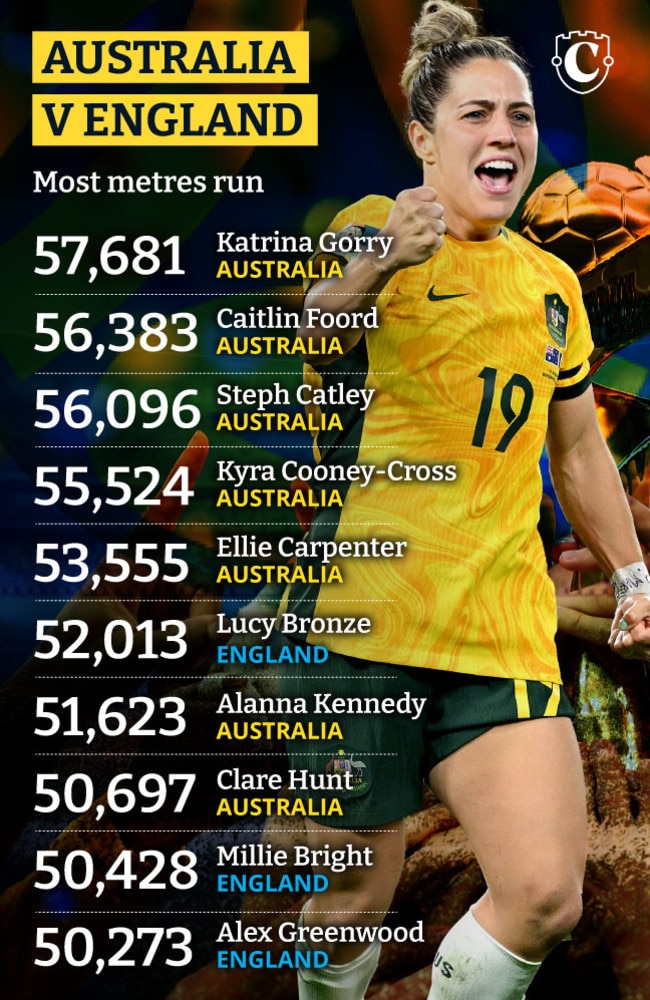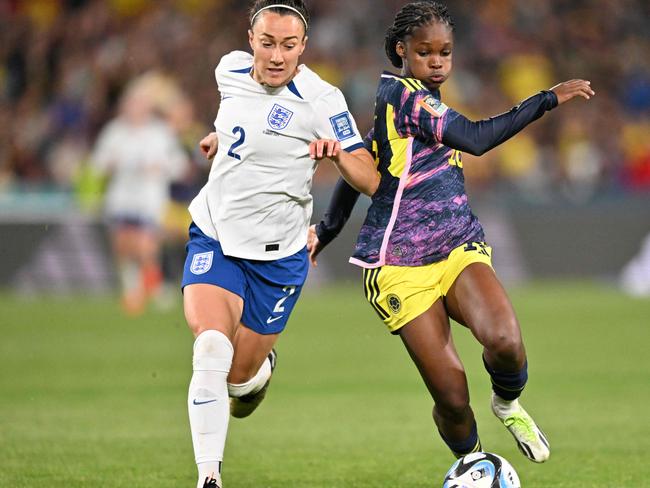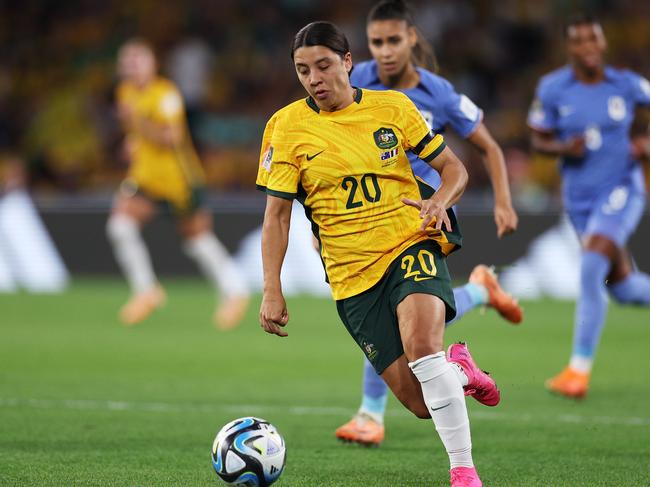Matildas v England: Australia’s core has carried a much heavier workload than Lionesses ahead of World Cup semi-final
A gruelling quarter-final win over France and a lightly-used bench has resulted in a huge workload for the Matildas, writes TILLY WERNER.

Football
Don't miss out on the headlines from Football. Followed categories will be added to My News.
The Matildas will need to draw on superhuman reserves – and the passion, hope and energy of a nation – to record a historic World Cup semi-final win over England, with FIFA data revealing the enormous toll the tournament has exacted on the Australians to date.
The Australians have run 22.5 kilometres further – and 5.28 more ‘intense’ kilometres at a speed of 19 km/h and over – than the Lionesses through the group stage, the Round of 16 and the quarter-finals.
And whereas Tony Gustavsson has leaned heavily on his core group and used substitutes sparingly, England manager Sarina Wiegman has spread the load more evenly across her squad.
The individual comparisons are stark.
Of the ten Australian and English players to have run more than 50 kilometres at the tournament, seven are Matildas – and all of the top five. Katrina Gorry (57,681 metres), Caitlin Foord (56,383 metres), Steph Catley (56,096 metres) and Kyra Cooney Cross (55,424 metres) have all eclipsed the 55 kilometre barrier, whereas Lucy Bronze leads all Lionesses with 52,013.

The Australians also have four players who have run more than four kilometres at high intensity – Ellie Carpenter (5,220 metres), Foord (4,805 metres), Catley (4,248 metres) and Hayley Raso (4,221 metres) – compared to England’s one (Bronze at 5,303 metres).
And it’s a similar story in terms of minutes played: eight Matildas have logged in excess of 540 minutes at the World Cup to date, while only three England players have done likewise.
The Matildas, too, have just four days to recover from a physically and emotionally draining quarter-final win over France. During that game, decided by the longest penalty shootout in women’s World Cup history, the Australians ran a combined 136.73 kilometres with nine separate players clocking over 11,000 metres (Mary Fowler led the way with 14,623 metres).
The Lionesses? They ran a total of 107.76 kilometres in their quarter-final victory over Colombia – Bronze logging the most metres with 10,695 – with 48% fewer intense runs than the Matildas.

Much of the discrepancy comes down to the opposing bench strategies of Gustavsson and Wiegman. Gustavsson’s 14 substitutions across the tournament have taken place on average at the 85 minute mark, whereas Wiegman’s 15 changes have averaged out at the 77th minute.
Gustavsson’s reliance on Australia’s core has served him well to this point, but England’s spread of fresher players, with less minutes and kilometres on average, will ensure the Matildas’ powers of endurance will be fiercely tested at Stadium Australia on Wednesday.
The Australians, though, have a potential ace up their sleeve.
Sam Kerr has run for just 8,610 metres at the tournament to date – and only 6,862 metres during the quarter-final epic against France. Her injection into the Matildas’ line-up in the second half against Les Bleus clearly energised the Australians and inspired a frenetic 10 minutes of play where the Australians threatened often.

With Kerr’s injured calf rested through the group stage, lightly tested against Denmark and worked harder against the French, the Matildas may well have a ready-made solution to any fatigue issues they may encounter in the semi-final.
The Matildas flew into Sydney on Sunday and utilised the Sydney Swans’ state-of-the-art recovery facilities on Monday in a bid to get an edge on England. But their biggest advantage in pursuit of a history-making debut World Cup final appearance may well be the 75,000-plus at Stadium Australia, the six million-plus watching on TV and the 26 million around the country pushing them on.
With an exhausting 584.79 combined kilometres in their legs at this World Cup to date (England have logged 562.29 kilometres), that adrenaline jolt might prove the difference between Matildas’ heartbreak and history.
Originally published as Matildas v England: Australia’s core has carried a much heavier workload than Lionesses ahead of World Cup semi-final




